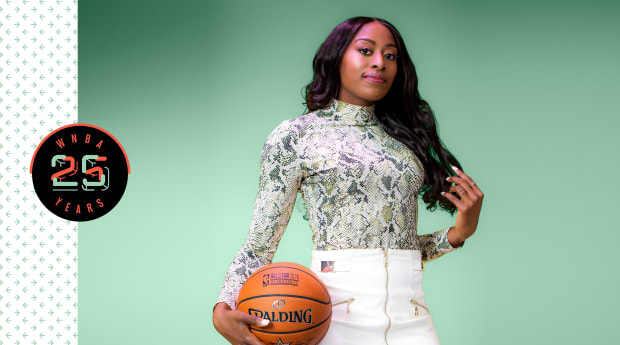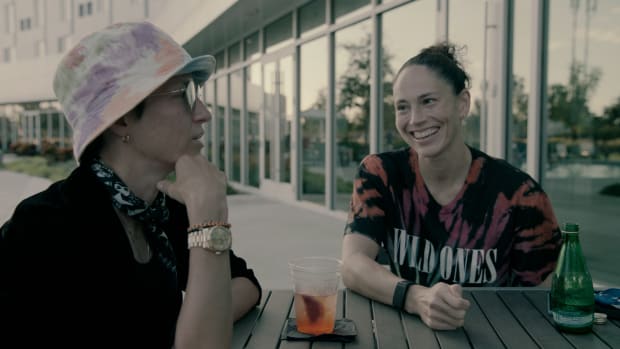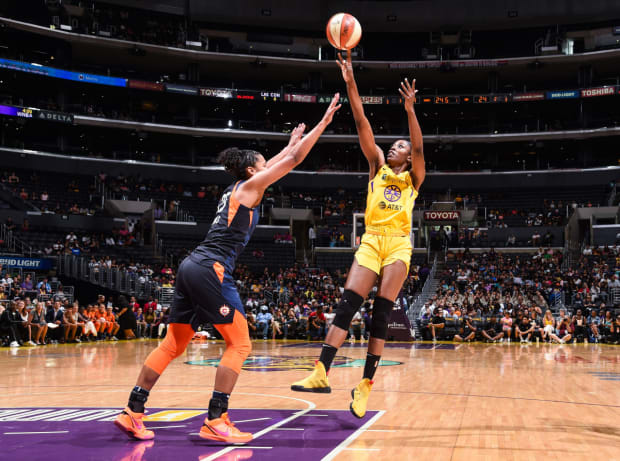The Sparks forward is an executive producer on ESPN Films’ ‘144’

Chiney Ogwumike is more than just vaguely familiar with the script of the upcoming ESPN Films documentary 144. In fact, she’s able to thoroughly describe its many scenes and recite long strings of dialogue with ease. In some ways, her detailed understanding of the project reflects the pressure she felt while making it. “Every second, every word, every scene, every choice. This is our one shot to tell people why the WNBA is dope on a grand scale,” says Ogwumike, who is one of the executive producers of 144. “We don’t carry that lightly.”
The film tells the story of the WNBA’s 2020 season, a year when Ogwumike herself opted out to be “proactively cautious and put my body first.” While the Sparks forward elected not to travel to the bubble, the idea for the project stemmed from a conversation with her sister Nneka early last July, in which the two remarked that those in the Bradenton, Fla., Wubble “are going to do something really special this year.”
Chiney, who last year also became the first Black woman to host a national, daily sports-talk radio show, realized that as a function of her job at ESPN she had the unique ability to try to find a creative way to capture the season. She called her agent, Allison Galer, about the idea and then WNBA commissioner Cathy Engelbert. She scanned the ESPN directory and figured out who to call at ESPN Films. “And after a five-minute conversation with myself, Allison, Cathy and [ESPN’s Adam Neuhaus],” Ogwumike says, “we all agreed, ‘Let’s figure out how to get it done.’ ”

The project dives fully into the WNBA’s contributions to the Say Her Name movement, which seeks to raise awareness for Black women’s experiences with police violence, and gives viewers a look into the leaguewide players-only meeting that was held following the shooting of Jacob Blake. “That was the ultimate sign of trust for our project,” Ogwumike says. Tameka Palmer, the mother of Breonna Taylor, is interviewed in the film.
Ahead of its debut this Thursday on ESPN at 9 p.m. ET, Ogwumike talked with Sports Illustrated about the film’s message, how the project influenced her understanding of the Wubble and, of course, her return to the court this season.
The following conversation has been edited for length and clarity.
Sports Illustrated: What was your involvement during the filming of the documentary?
Chiney Ogwumike: My life during the season was every day I was on a platform. As one of the few Black women at ESPN that are sport analysts, with everything that was happening in society that had athletes speaking out, I was always speaking on-air. I was on a number of platforms explaining how the WNBA and the NBA seasons came to be, why they chose this or that, why they put Black Lives Matter on the court. As a member of the [WNBA Players Association] executive committee I was in constant communication with everyone in the bubble. And my job was to explain that to the masses, whether it was on ESPN, CNN, MSNBC. It was just interesting as people saw me as a voice of translation.
And then ever since early July, when we first discussed the project, at least two hours of our day—myself, Allison and our two directors, Jenna Contreras and Lauren Stowell—we were coordinating this project. So I was talking to players, texting players about it. It was literally coordinating where the cameras could be and using my relationships with the players to build trust and capture the content we saw.

SI: Late in the film, there’s a conversation between Sue Bird and Megan Rapinoe, where Megan tells Sue of the Wubble and its challenges, “You see the full breadth of a human being going through all of this, all the time. And it’s kinda been comforting, in a way, to go through it with everyone else. You guys are amazing.”
Do you look at Megan’s observation on how the Wubble showed the full range of W players as one of the messages you all wanted to project? A goal you wanted to accomplish?
CO: We came in with zero goals, besides having an opportunity to capture something that people should value, which is the 144 [players]. We did not know, obviously, that Jacob Blake would rock our country again. We were just there. And I think a good analogy of what this film is, is the essence of what the WNBA players are. We’ve always been doing more. Whether it’s as mothers, social justice advocates, caring for our communities, just competitors. So that’s a really interesting point [that Megan makes], because what Megan says is something that we know. But it’s nice to hear from people that support you. We know, as women’s basketball players, that no one easily gives us credit. But in that scene with Megan, she’s saying something and you can sort of see how Sue’s like, Wow, it’s nice to be seen.
SI: What do you then think the prevailing message of the project is?
CO: I would say the prevailing message is that these women go above what is required of them and deliver. As mothers, as competitors, as advocates, we’re expected to be athletes, but by nature of being a league that is 80% Black, we have to go above that because there is much more at stake. We birth the next generation. We go home to our communities. People see our success as the exception, and not the norm. And so it’s on us to help create constantly for others.
I think that’s what this film shows, and the most important part is solidarity, too. You know? We’re predominantly Black women, but you have allies, you have advocates, you have people that may not even agree with everyone, but we understand that standing together is the only way you can push things forward.
SI: One of the most poignant moments in the film is the behind-the-scenes look into the players-only meeting following the Blake shooting. The film really does take viewers into what the conversations were like and it shows the varying opinions on the resumption of pause, and eventual resumption, of play. What did you want to show in that moment?
CO: Just to show that every voice matters when it comes to discussions, that every voice is valued, that you have women that are trying to figure out how to make an impact. I think overall, it just is a glimpse into how women band together, even in the hardest moment. And how disagreement does not mean disappointment; it just means you’re constructively moving forward in a direction where we can figure things out together. We may have some questions in that moment, but guess what. We push through.
SI: How did your understanding of the WNBA bubble change throughout the filming process, if at all?
CO: My understanding in real time was phone calls, was from WhatsApp, Instagram, FaceTime. I think my understanding changed when I saw the emotional toll this was taking on the players. You can see that [in the documentary] through [Lynx forward] Natalie Achonwa. Her interviews are so powerful. But every person that steps to the camera is finding this superhuman strength to speak about things they normally wouldn’t be comfortable speaking about.

SI: Switching gears a little bit, you didn’t play last season but are back with the Sparks this year. What’s the adjustment back to the team been like?
CO: I’m really grateful to have the opportunity to be back on the court, because that’s where I feel free. I finally found a rhythm here in Los Angeles, working from home, with ESPN, working on this project and then also having resources to go and work [on basketball]. It’s also been about committing myself to getting my body better and my game better, and forcing myself to grow. I’m really excited for the season because I think this is a growth year for me. Growth requires growing pains, and I guess that’s where I’m at. I’m also really excited to be competitive with my sis [Nneka].
SI: How will your game look differently? What’s the biggest thing you worked on?
CO: My jumper. I’ve always known I can shoot. It is just about figuring out my timing and rhythm. As a player, I always think that like, why shoot, when I can pass and get someone a better look, or find someone in the paint, or get in the paint and score, or get a rebound, right? But at some point if you don’t force your growth, you’re hurting the team.
More WNBA:
• How One Hoodie Became the WNBA’s Defining Symbol
• The 25 Greatest Moments in WNBA History
• Cynthia Cooper Is the WNBA’s Unsung Star
• How No. 1 Picks Realized a Career in the WNBA Was Possible